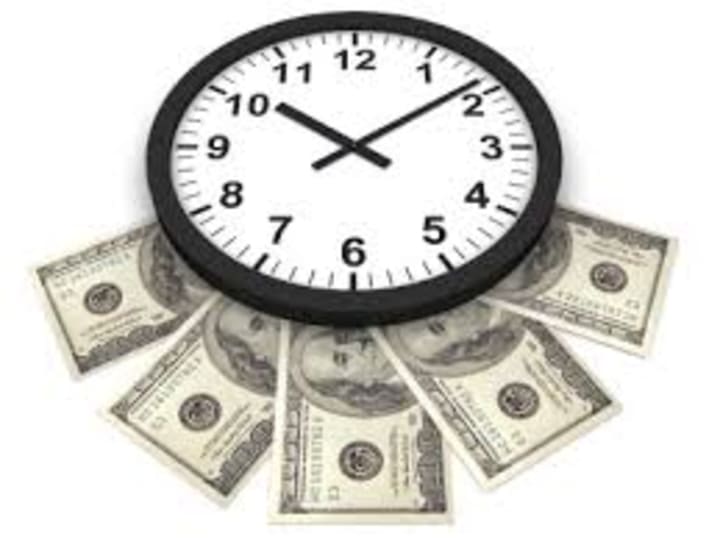
Once upon a time in a bustling city, there lived a man named Ethan. Ethan was a successful businessman known for his efficiency and productivity. He firmly believed in the adage "Time is money," and he had built his empire on this principle.
Ethan's life revolved around his work. From the early morning hours until late at night, he immersed himself in meetings, emails, and endless tasks. Every second of his day was accounted for, as he aimed to maximize his profits and minimize wasted time.
One fateful day, as Ethan rushed to yet another important meeting, he stumbled upon an old man sitting on a park bench. The man had a kind smile and a twinkle in his eyes. Intrigued, Ethan paused and struck up a conversation.
The old man introduced himself as Samuel, a retired watchmaker. He spent his days in the park, observing people and cherishing the simple joys of life. Curiosity piqued, Ethan asked Samuel how he managed to find contentment without constantly chasing after time.
Samuel chuckled and replied, "My dear friend, time is a precious resource, but it is not synonymous with happiness. It is how we choose to spend our time that truly matters." He explained that while Ethan focused solely on financial gains, he had missed out on the beauty and richness of life.
Intrigued by Samuel's wisdom, Ethan decided to take a step back and reevaluate his priorities. He realized that true wealth lay not just in monetary success but also in the experiences, relationships, and moments he had overlooked.
From that day forward, Ethan made a conscious effort to strike a balance between work and life. He learned to appreciate the value of taking breaks, spending time with loved ones, and pursuing hobbies that brought him joy. As a result, his work became more meaningful, and his relationships flourished.
Ethan discovered that time, when used wisely, could be a catalyst for personal growth, self-reflection, and building lasting connections. He no longer measured success solely by financial gains but by the fulfillment and happiness he found in both his personal and professional life.
The tale of Ethan and Samuel reminds us that time is indeed a precious resource. However, it is not the mere accumulation of minutes and hours that defines our worth. Instead, it is how we choose to invest our time that truly determines the richness of our lives.

Techniques to Manage Your Time Effectively
Managing time effectively is key to achieving a healthy work-life balance and maximizing productivity. Here are some techniques to help you make the most of your valuable time:
1. Prioritize Tasks
Identify the most important and urgent tasks on your to-do list and tackle them first. Prioritizing allows you to focus on what truly matters and avoid getting overwhelmed by less critical tasks.
2. Set Clear Goals
Define specific and achievable goals for each day, week, or month. Setting clear goals provides direction and helps you stay focused and motivated.
3. Minimize Distractions
Limit distractions such as social media, email notifications, or excessive multitasking. Create a conducive work environment and establish designated periods of uninterrupted focus.
4. Practice Time Blocking
Time blocking involves scheduling specific blocks of time for different tasks or activities. This technique helps you allocate your time efficiently and ensures that you dedicate focused periods to important tasks.
5. Learn to Say No
Saying no to tasks or commitments that don't align with your priorities or values is crucial. Recognize that your time and energy are limited, and prioritize activities that align with your goals and well-being.
6. Delegate and Outsource
Delegate tasks that can be done by others, whether it's at work or in your personal life. Delegating allows you to free up time for more important responsibilities or activities that require your specific expertise.
7. Take Breaks and Rest
Regular breaks and moments of rest are essential for maintaining productivity and avoiding burnout. Schedule short breaks throughout the day to recharge and give your mind and body the opportunity to rejuvenate.
8. Practice Time Management Tools
Explore time management tools and techniques that work best for you. From digital calendars and to-do lists to project management software, various tools can help you organize and track your tasks effectively.
Remember, effective time management is not about squeezing every minute out of the day but rather making conscious choices about how you invest your time to align with your priorities and goals.
Conclusion
In the fast-paced world we live in, it is crucial to remember that time is not solely a means to earn money. It is a gift that allows us to create meaningful experiences, nurture relationships, and find fulfillment. By finding a balance between work and life, we can unlock the true value of time and embrace a more holistic and rewarding existence.
FAQs
1. Why is time considered valuable?
Time is valuable because it is a finite resource that cannot be replenished. Once time passes, it is gone forever, making every moment precious and irreplaceable.
2. How can I make the most of my time?*
To make the most of your time, prioritize tasks, set clear goals, minimize distractions, and create a schedule that allows for a healthy work-life balance. It's also essential to allocate time for self-care, hobbies, and meaningful interactions with loved ones.
3. Does valuing time mean neglecting financial success?*
Valuing time does not mean neglecting financial success. It means understanding that financial gains are not the sole measure of a fulfilling life. Balancing work and personal life allows for a more holistic approach to success.
4. Can time be wasted?*
Time itself cannot be wasted, but how we choose to spend it can be. Engaging in unproductive activities or neglecting personal growth and relationships can be considered as wasting time.
5. How can I find a balance between work and life?
Finding a balance between work and life involves setting boundaries, prioritizing self-care, learning to delegate tasks, and fostering open communication with employers, colleagues, and loved ones. It is a continual process of self-reflection and adjustment.





Comments
There are no comments for this story
Be the first to respond and start the conversation.